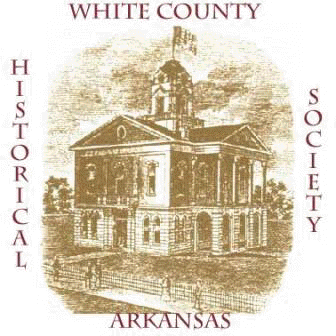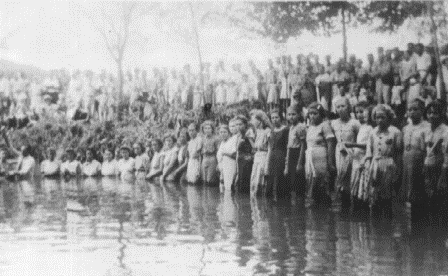

Letona--Said to be Named for Indian Maiden

Photo courtesy Betty Bennett
Letona Baptist Church baptizing, c1930.
Letona, a town with 218 residents in northern White County, may have one of the most romantic names in Three Rivers country. Tradition has it that the town was named for an Indian maiden.
"That’s what I’ve always heard," longtime resident Lowell Wyatt said recently. "Indians had lived here and were still around in the late 1800s."
Though he wasn’t sure when the first settlers arrived, Wyatt said there weren’t many people or stores until the Missouri and North Arkansas Railroad came through the town in 1905 or 1906.
A community near Letona that Wyatt called West Town had a cotton gin in the late 1800s, he said. Betty Bennett, who now has Letona’s only store, may have been referring to the same community when she said there had been an earlier little town with a gin and a few houses about a mile away. She said it was called Cox, and that Letona was almost located there.
Bennett said her great-grandparents were the first members of her family to live in the area. Edgar Whisnant, her grandfather, was one of the carpenters who built houses and stores in Letona before the turn of the century.
"Letona used to be quite a little town," Barnett said. "There were at least eight stores, a cafe and a doctor’s office." (The physician was Dr. A. L. Spain, who had delivered 2,000 babies by age 75. He died at 85 in 1958. He was said to have never sent a bill for his services to his patients.)
A bank was just about to open in those growing days, but a tornado blew it away before it opened. The same storm "scooted the old Baptist church almost off its foundation," Bennett said.
Letona was a logging community a century ago and the first railroad came through for logging, she said. Cross-ties for railroads were made in Letona, and farmers brought their cotton to its gin.
In Bennett’s mother’s time, the town had a high school, but it had cut back to eight grades when Bennett went there. After consolidation, students had to walk two miles east to Arkansas l6 and catch a school bus to a Searcy school.
Bennett played forward on the girls’ basketball team. "We didn’t have a gym, so for night games we went to Morris School and played indoors," she said.
She remembers history class field trips to Mount Pisgah and climbing the mountain to see the remains of a fort. The Old Military Road ran close to Letona and through Mount Pisgah, and minie balls from the Civil War could still be found in those days.
Bennett said her grandmother had the first car in the community. Her mother told her it had curtains around it. Bennett’s store is in a building used earlier for a grocery store and the Letona Post Office, which began mail service in 1908. She still has some of the grocery store’s fixtures, including a heavy table with stovepipes around its legs. "Cured meat was kept on the table, and the stovepipes kept the mice away," she said. Bennett uses her store as a pizza parlor, beauty salon and ceramics shop.
J. B. Brownfield has lived in Letona since January l952. His parents moved there while he was serving with the 2nd Infantry Division in Korea. As a machine gunner in the Korean War, he was wounded three times, he said. Once was by American artillery, which fired on his position thinking it was enemy territory. He has served on the city council, and his wife Peggy is the treasurer-recorder now. Letona has been incorporated since 191l, he said.
When he came to Letona 48 years ago, Letona had a gin and a grocery store. Another grocery store was added the next year. The Missionary Baptist Church and the Church of Christ were active then and still are.
In recent years, the town has added a volunteer fire department and a community center. The center was named after mayor Sherrel Bennett. In December, the senior citizens served a big country breakfast there to raise funds to keep the center going. Meals for senior citizens are served there on Tuesdays and Thursdays, and the seniors have bought a refrigerator, stove and supplies for the center. They have also built cabinets. On most first and third Saturday evenings, the center is the place to go for music. Betty Bennett plays an autoharp or a hammer dulcimer: other musicians play guitars, the piano and other instruments. "Someone will start a song, and everyone will join in," Brownfield said.
Letona has had two Christmas parades in recent years. TV personality Chuck Dovish was on hand for one of them and a Medivac helicopter from Baptist Medical Center in Little Rock was there for the other.
Brownfield began farming when cotton and corn were the main crops around the community. Cotton stopped in the early 1960s, he said, and now the land is used mostly for soybeans, milo and corn for chicken feed. A few people have cattle.
Big Creek is a good place to fish for catfish and buffalo near Letona, Brownfield said. A 57-pound catfish was caught in the creek by Ella Adams in the ’40s. Deer are also plentiful. "We counted 18 between here and Sidon [seven miles away] one night in October," Brownfield said.
For people who like to ride horses, go on hayrides or make trail rides, Marlon Covington is the person to see. He has a sign advertising horses for rent on Arkansas 310 in Letona.
Ron Busbea, the postmaster since 1995, said one of the reasons he wanted the Letona post office job was the Bluff Hole on Big Creek. "It’s a natural swimming hole that’s been used since Indian days," he said. "It’s a good place for cookouts and for kids to play."
Busbea has a number of pictures of old trains that came through Letona on display in the new post office, built in 1996. One photo shows "The Moose," a stylish train of the ’40s; it brought mail and up to 18 passengers at a time to the Letona depot.